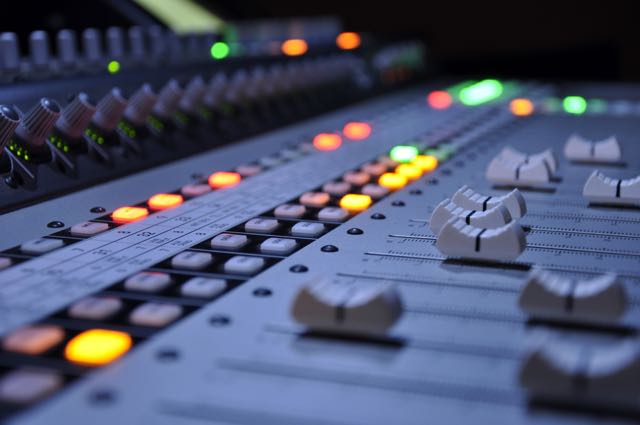A magazine where the digital world meets the real world.
On the web
- Home
- Browse by date
- Browse by topic
- Enter the maze
- Follow our blog
- Follow us on Twitter
- Resources for teachers
- Subscribe
In print
What is cs4fn?
- About us
- Contact us
- Partners
- Privacy and cookies
- Copyright and contributions
- Links to other fun sites
- Complete our questionnaire, give us feedback
Search:
Peak levels: Anyone can get the sound right
by Paul Curzon, Queen Mary University of London

The 'Peak level meter' is an essential tool of an audio engineer. It's used to adjust volume levels. For example, there may be odd moments when a recording is far, far louder than the rest of the track. So loud that the sound will distort when played. The engineer therefore tones it down a bit. Small nudges here and there make a massive difference to the quality of the final sound. A peak level meter is just a gauge that helps. It shows the sound level in real time as the engineer listens to the audio, blinking if the sound even momentarily reaches a critical level where something must be done. It's completely visual though so is completely inaccessible to a blind person.
The DePIC research team decided to fix the problem. They are a group of people from Queen Mary University of London, Goldsmiths and Bath Universities with a mission to solve problems that involve the senses. They've created the first ever plug-in software for professional Digital Audio Workstations that makes peak level meters completely accessible. It uses 'sonification': it turns those visual signals in to sound!
But hang on, the whole idea was that the meters were visualising sound in the first place! How can sonification be better than listening to the original sound? It isn't the original sound that matters to the engineer just a particular feature of it - the level of the signal. A peak level meter presents that abstraction of the sound to the engineer. An accessible version must do the same. Choosing the right abstraction for the job is an important part of computational thinking. The team's peak level meter sounds a beep whenever the meter flashes. It also changes the pitch of the beep according to how much too high the level is. This new signal is played over the top of the original and the engineer listens to both at the same time. The team are now getting feedback on it from audio engineers and will improve it as a result.
So far the feedback has been good. Sometimes two sounds are better than one!


